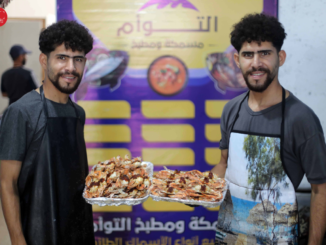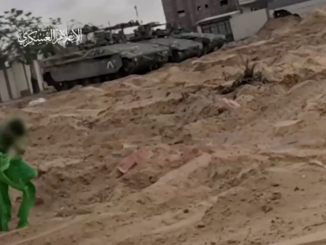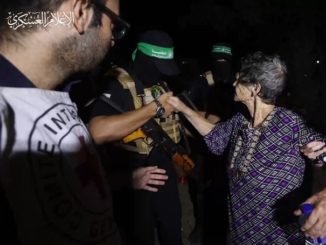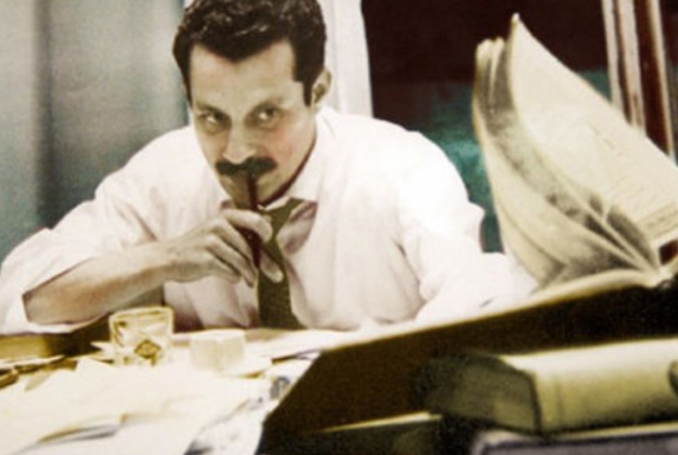
Ghassan’s leadership went “far beyond” his official positions, according to his Syrian friend and comrade Adnan Badr Helou, author of ‘The Airport of Revolution in the Shade of Ghassan Kanafani.’
Witnessing the rebirth of the national liberation struggle in 1968, Palestinian socialists Ghassan Kanafani and Abu Ali Mustafa stood and conversed in Jordan.
The defeat of Nasser-led Arab armies in June 1967 had expanded Zionist control of historic Palestine, propelling an intensified armed struggle led by the refugees.
Amidst the arid heat, the two scanned the horizon at a desert training camp for the Popular Front for the Liberation of Palestine (PFLP):
Ghassan: We are the exiled revolution heading towards a land of adversity.
Abu Ali: What do you see?
Ghassan: If the revolution can preserve itself, we are closer to home.
Ghassan and Abu Ali were martyred for their leading roles in Palestinian resistance – by the regimes of Golda Meir and Ariel Sharon respectively – yet the images of both remain present among those resisting genocide with their bodies and minds. Abu Ali’s name was bestowed upon the PFLP military brigades, involved in the intense fightback in Gaza after October 2023. Ghassan was the Marxist intellectual, writer, novelist and artist whose work is the subject of intense renewed interest.
Ghassan had been a member of the PFLP central committee and was appointed to its political bureau upon his 8 July 1972 assassination. But Ghassan’s leadership went “far beyond” his official positions, according to his Syrian friend and comrade Adnan Badr Helou,[1] author of The Airport of Revolution in the Shade of Ghassan Kanafani.
Adnan had been active in the Arab Socialist Movement which, after the June 1967 Naksa, joined an opposition front with the Arab Nationalist Movement (ANM), led by George Habash. Both organizations were subject to repression by Arab states, with Habash and others arrested in Syria in March 1968. Adnan remembers being placed on a list of fugitives, “even though I was in Lebanon studying third-year chemistry at Haigazian University” in Beirut.
At this moment, he says:
“Palestinian fida’i operations had intensified as the high point of Palestinian and Arab nationalism, and sparked the enthusiasm of young people across the entire Arab world.”
In this climate, Adnan took the decision to “leave academia and join the revolution.” Palestinian painter Nabil Abu Hamad introduced him to Ghassan:
“There was an immediate connection between us as he explained the damage caused by the disputes tearing the forces of the Arabist movement apart, of which the disaster of 1967 was a key factor. And the necessity of learning the lesson of these important events to forge a new path, to turn the page on the disputes and build through a new, higher stage, through the unity of all forces of national liberation.”
Bringing together the Palestinian ANM branch, along with a group of socialist and national liberationist organizations, the PFLP was founded in December 1967. In common with the experiences of its other activists, from Habash to Leila Khaled, the paths of Adnan and Ghassan converged politically.
While Adnan says, “I was committed to Marxist thought from the beginning,” this commitment was critical of the “official” Syrian Communist Party, whose position was “lacking on the question of the Arab liberation struggle.” As for Ghassan, “His development from Nasserist to Marxist thought came in the context of the transformation of the ANM, with and after the 1967 defeat.” Ghassan’s principles were evident with abundance in his novels and short stories:
“They were produced with the kind of class consciousness that revolves around the lives of the poor, the refugees and the camps… The progressive intellectual horizon of this literary commitment expressed Ghassan’s political convictions.”
At the time of their meeting, Ghassan had begun to edit the PFLP newspaper, al-Hadaf, issued weekly from July 1969, and Adnan was invited to write columns and editorials. There was crucial context. Adnan emphasises that “Ghassan was one of the few intellectuals formerly of the ANM who did not defect along with the Democratic Front [DFLP]” in 1968-69.
Led by Nayef Hawatmeh, this faction remained in control of the ANM newspaper al-Hurriyya. The fact that Ghassan had remained steadfast in resisting the split was hugely important to PFLP leaders Habash, Maher al-Yamani and Wadi’ Haddad.
Ghassan had been well-known before 1967, both as a creative writer and as a professional journalist. Becoming editor of al-Hadaf meant renouncing the privileges he had enjoyed at Dar al-Sayyad publishing house, “leaving behind a much higher salary than he would receive at al-Hadaf.” Forging a new, Marxist-Leninist avant garde, the results were explosive:
“Ghassan’s leadership of al-Hadaf and revolutionary media were felt locally, across the Arab world and even internationally, attracting huge support for the PFLP in the Palestinian sphere.”
At the same time, there were new battles developing within the Front and the contexts in which it fought. After Black September 1970, the huge confrontation the repressive Jordanian state, the frontline had shifted to Lebanon, with growing questions around organisation and political strategy.
In a stormy fifth PFLP conference in al-Beddawi refugee camp, northern Lebanon in March 1972, Adnan remembers Ghassan intervening strongly. He was elected to write the resulting document, the ‘Tasks of the New Stage.’
Aligned to Wadi’ Haddad, Ghassan represented the revolutionary left of the PFLP,
“consisting of the progressive, leftist thought that the Front carried with it during its transformative phase – expressed in its literature, publications, positions and its newspaper… There is no doubt that Ghassan played a major role in the left. Those of this ideology deliberately referred to themselves as the ‘resistance trend’.”
A year earlier, Ghassan had analysed the possibilities for a wider guerrilla war in an interview Irish writer Fred Halliday. Though resistance across historic Palestine was still to develop along these lines, he observed, “Gaza is another story altogether.” For the “Tasks of the New Stage,” Ghassan wrote:
“The resistance experience in Gaza constitutes one of the most prominent historical experiences concerning the capacity of a small, poor unarmed and geographically isolated people to continue, given its conditions a heroic and almost unknown struggle.”
Adnan remembers a close relationship between Ghassan and Haddad, with both favouring ties to the Soviet Union. In the months before Ghassan’s assassination, thugs attacked him in Beirut. While others claimed that these were not Mossad tactics, Haddad argued the opposite, remembers Adnan:
“Wadi’ felt that Ghassan was in danger and sought to provide him with all the necessary protection: moving him to a safe house, another office with new guards, reporters and so on.”
Haddad proved to be correct in his estimation. But, says Adnan, “the sound of (Ghassan’s) absence grows stronger by the year”:
Let us find in this evidence of Ghassan’s importance and the increasing effectiveness of his legacy in building support for the Palestinian struggle, while strengthening global and humanitarian sympathy of the cause of the struggling Palestinian people.
[1] Quotes from an interview with the author in October 2023.
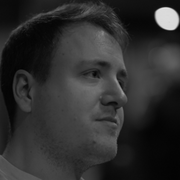
– Louis Brehony is a musician, activist, researcher and educator. He is author of the book Palestinian Music in Exile: Voices of Resistance (2023), editor of Ghassan Kanafani: Selected Political Writings (2024), and director of the award-winning film Kofia: A Revolution Through Music (2021). He writes regularly on Palestine and political culture and performs internationally as a buzuq player and guitarist. He contributed this article to The Palestine Chronicle.



